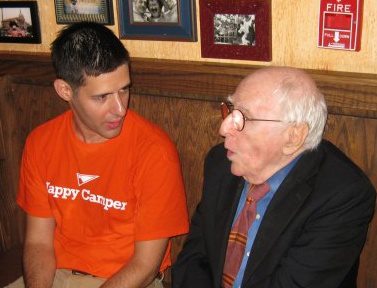First published at Between the Lines News on October 20, 2011
I was in San Francisco when I received the news, about to go on stage to deliver a National Coming Out Day lecture. A friend texted me: “Frank Kameny passed away today.” The godfather of the gay rights movement was felled by a heart attack at the age of 86.
Like others, I saw Frank as a movement giant. But I also had the great privilege of knowing him personally, having participated on a listserv and exchanged many e-mails with him over the years. Mostly I saw him as a moral force, an elder from whom to draw both wisdom and fortitude.
I last saw Frank two years ago, when I was a volunteer faculty member for Campus Pride’s Leadership Camp. Camp was in D.C. that summer, and when I told everyone that I knew Frank and that I could arrange for him to visit, I drew the expected reaction: the faculty were in awe, and the campers (all of whom were college students) were quizzical: “Who’s Frank Kameny?”
The easiest way for me to answer that question succinctly was to say, “Frank Kameny is like the Rosa Parks of the gay rights movement.” But the analogy is imperfect in many ways. Parks’ civil disobedience was backed by an organized movement; Kameny had to forge a movement. Parks is in the history books; Kameny—like LGBT history more generally—has been largely overlooked, despite his half-century of leadership.
It is no exaggeration to say that every living LGBT person has benefited from that leadership. Frank was out and fighting at a time when being openly homosexual was not only professional suicide—Frank lost his job as a government astronomer in 1957, and never again worked in the field—it also put one in physical danger. But Frank never shrank from the fight for justice.
Elsewhere in this issue is a full obituary, detailing Frank’s many accomplishments. Here I want to highlight three lessons which I personally carry with me thanks to Frank. They were the sort of things of which he would often remind me and others in the vigorous e-mail correspondence he kept up; things that, even now, I can hear his distinctive voice saying.
Jonathan Rauch once wrote aptly that Frank’s voice “has been compared, unfairly, to a foghorn (unfairly, that is, for the foghorn).” But foghorns do get your attention.
The first lesson is parity. Whenever someone asked “What makes people gay?”, Frank insisted that the question could not be separated from the question “What makes people straight?” Because of his unrelenting belief in equality, he challenged any approach that treated homosexuality as “abnormal” or in need of some special explanation.
The second is engagement. Whenever Frank would hear me or other “young” activists griping about some stupid anti-gay argument, policy, or legislation, he would growl “Don’t tell me, tell them! Contact the people who can do something about it.”
Frank himself was constantly writing letters to anti-gay legislators, public figures, and bloggers. Here’s an excerpt from one, written in Frank’s distinctive style:
“Our true God gave us our homosexuality as a divinely-inspired gift and blessing, to be enjoyed to its fullest, exultantly, exuberantly, and joyously.
‘Gay is good, Godly, moral and virtuous, and American. You homophobes are evil, ungodly, immoral and sinful, irrational to the point of utter lunacy and beyond, and un-American and anti-American. You don’t have a clue to what America and true Americanism are all about.”
The reference to “God” is amusing: Frank was an outspoken atheist. But he didn’t mind helping himself to religious rhetorical flourish when the moment called for it.
The third lesson was about seizing the moral high ground. Frank understood that the fight for equality was a MORAL fight if anything is. He once told me that his own proudest accomplishment was coining the slogan “Gay is Good” in 1968; it captured his vision succinctly.
My own work as “The Gay Moralist” has been powerfully influenced by Frank’s example of never conceding “moral values” to the other side.
Let me close with a favorite personal anecdote.
In 2004 Frank came to Detroit to speak at a screening of the documentary “Gay Pioneers,” in which he is prominently featured. Before the film Frank visited my house for dinner. When I offered drinks in my living room, he asked if I had any peach schnapps. To my surprise, I found some in the cabinet, so I poured him some. Then some more, and more again, not really keeping track. Finally, when it was time to leave for the film, we all stood up…
…and Frank proceeded to trip over my coffee table and fall flat on the floor.
Everyone gasped. A news headline flashed before my mind: “Young gay writer kills veteran gay activist with cordial.” But then Frank spryly jumped up, laughed, and boomed in that unforgettable voice, “Too much peach schnapps!!!”
I’m raising a glass of schnapps to you, Frank. We will always remember: Gay is Good.
